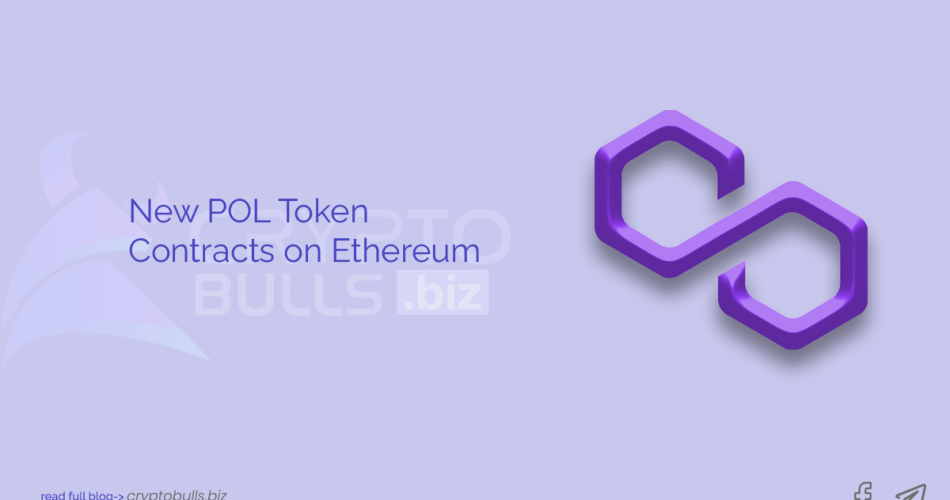New POL Token Contracts on Ethereum
The Polygon network’s POL token, a vital component of the Polygon ecosystem, enables smart contract execution on the Ethereum Mainnet through the Ethereum Virtual Machine.
Introduction:
Polygon Labs is at the forefront of enhancing the Polygon ecosystem by deploying the next-gen cryptocurrency, POL, on the Ethereum Mainnet. This upgrade, a step beyond the original MATIC token, aligns with the Polygon 2.0 architecture. The Polygon team’s vision includes launching a new staking layer, which will power various Polygon Layer 2 chains and contribute to the value layer of the Polygon network. This upgrade involves transitioning Polygon’s proof-of-stake mechanism to zkRollup technology, implementing a ZK-powered interoperability and shared liquidity protocol across multiple chains, and optimizing the smart contract execution on the Ethereum network, further solidifying Polygon’s position within the vast blockchain ecosystem.
The POL token upgrade, led by Polygon Labs, symbolizes a significant milestone in the evolution of the Polygon ecosystem, paving the way for enhanced value creation and shared liquidity protocol across Layer 2 solutions. With this deployment on the Ethereum Mainnet, Polygon is reinforcing its commitment to scalability, interoperability, and improved staking mechanisms, all while nurturing a vibrant and expansive network of projects within the blockchain space. This comprehensive upgrade represents Polygon’s continued dedication to providing robust solutions for the blockchain community, including the MATIC token, new staking layers, and the overarching Polygon network.
Some fundamental of Token and pol token upgrade:
The POL token’s fundamental role within the vast Polygon ecosystem extends to being the primary cryptocurrency for the Polygon 2.0 upgrade. It underpins an expansive network of zero-knowledge-based Layer 2 chains, including the Polygon zkEVM network and application-specific blockchains running over the main Polygon network. POL’s utility is multifaceted, as it facilitates staking, community ownership, and governance, making it a vital component of the value layer in the Polygon ecosystem. This native re-staking protocol empowers POL holders to validate multiple chains and take on diverse roles across these chains, enhancing interoperability and efficiency.
The POL token upgrade, led by Polygon Labs, signifies a crucial advancement in Polygon’s mission to provide a seamless and powerful Layer 2 solution for the Ethereum network. It plays a pivotal role in supporting smart contract execution and shared liquidity protocols, solidifying its significance within the broader blockchain landscape. As the main cryptocurrency for the Polygon 2.0 ecosystem, POL serves as a unifying token across various Polygon-based networks, reinforcing its importance and utility in the rapidly evolving blockchain space, bridging the worlds of Layer 2 solutions, Ethereum Mainnet, and the broader digital asset community. These advancements will likely be a focal point at the upcoming Benzinga Future of Digital Assets conference, showcasing the latest trends and innovations in the digital asset realm.
Reasons behind Polygon’s decision
Polygon’s decision to deploy new POL token contracts is driven by a strategic vision to strengthen and expand the Polygon ecosystem. As the primary cryptocurrency within the Polygon network, POL plays a pivotal role in the value layer, enhancing the ecosystem’s overall utility and capabilities. The deployment on the Ethereum Mainnet underscores Polygon’s commitment to providing robust solutions, especially in the transition from Polygon’s proof-of-stake (PoS) mechanism to zkRollup technology.
By introducing a new staking layer, Polygon aims to fuel various Layer 2 chains, allowing POL holders to validate multiple chains and take on diverse roles across this interconnected web of chains. This approach fosters a more extensive and interconnected ecosystem, further solidifying POL’s importance as a unifying token across the Polygon network, including the main Polygon blockchain, the Polygon zkEVM network, and supernets like application-specific blockchains.
The introduction of smart contracts and the shared liquidity protocol on Layer 2 solutions is facilitated by the POL token upgrade, emphasizing its role in optimizing transaction efficiency and interoperability across chains. Polygon Labs, as a key contributor to this initiative, reinforces the network’s commitment to innovation, ensuring that the POL token remains a cornerstone of the rapidly evolving blockchain landscape. This move represents a strategic alignment with the architecture of Polygon 2.0, aiming to enhance the Polygon ecosystem and its shared value across multiple chains within the broader Ethereum network.
What is Impact of this decision:
The announcement of the new POL token had a minimal impact on MATIC’s price, which remained around the $0.63 range despite its recent 25.22% gain over the past week. This stability indicates that the market’s reaction to the development was relatively muted.
As for the full migration to the new POL token, it’s expected to take place in 2024. This extended timeline allows for a gradual and well-planned transition, ensuring a smooth process for all stakeholders.
The metrics for network growth on the Polygon network showed a decrease, reflecting a decline in the number of new addresses interacting with the network. This decline suggests that new entrants who typically confirm adoption through transactions have temporarily reduced their activity. However, there was a contrasting trend with the number of active addresses in the last 24 hours, which had increased to 2237. This surge in daily active addresses indicates a heightened level of engagement and interaction with the MATIC token.
It’s worth noting that some concerns were expressed about the inability to migrate back from the new POL contract to MATIC. However, David Silverman, the VP of product at Polygon Labs, addressed this issue, explaining that the migration process from MATIC to POL has already begun and will occur in stages, ensuring a smooth transition for users.
Conclusion:
Polygon’s decision to deploy the new POL token and its associated upgrades underscores its commitment to fortifying the Polygon ecosystem and the broader blockchain landscape. The introduction of POL as the central cryptocurrency within the Polygon network and its role in the value layer emphasize Polygon’s dedication to providing comprehensive and innovative solutions. The shift from Polygon’s proof-of-stake (PoS) mechanism to zkRollup technology, coupled with the introduction of a new staking layer, positions Polygon to fuel and connect multiple chains, fostering interoperability and a more interconnected ecosystem.
The POL token’s upgrade also enhances smart contract execution and shared liquidity protocols on Layer 2 solutions, optimizing transaction efficiency and overall network performance. While the market response, as seen with MATIC’s price stability, suggests a measured reaction, the extended migration timeline to POL in 2024 ensures a well-planned transition.
Overall, Polygon’s strategic moves, spearheaded by Polygon Labs, are poised to cement its standing in the blockchain industry. POL’s central role and the comprehensive upgrades highlight the network’s commitment to scalability, innovation, and long-term sustainability, benefitting both its existing ecosystem and the broader Ethereum network. As the blockchain space continues to evolve, Polygon’s strategic decisions and developments are expected to play a crucial role in shaping its future outcomes.


